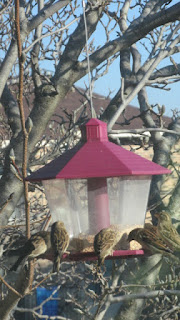We don't always have to be extremely serious, although the times seem to require it most of the time.
I find that I like my wines these days to be as light as possible -- for their type, that is; I am not asking for flawed or exhausted productions, just subtle ones. McKinley Springs 2010 Washington state cabernet sauvignon is just so. It pours in the glass as clear as jelly, and goes on to impress not with fruit basket metaphors but with a refreshingness all its own. "It's just wine." Retail, about $20.
The same is true for Valpolicella. Choose your producer. This one was Buglioni. Retail, about $15.
Now, back to blogging the West's sources.
Matthew, chapters 3 and 4. Very weird. In chapter 3, which is all of three paragraphs, John the Baptist appears out of nowhere, immersing throngs of people in the Jordan River "as they acknowledged their sins." He rebukes the authority figures of his day, the familiar can't-have-one-without-the-other duo of Pharisees and Sadducees, warning them that mere baptism without good deeds is useless. And he predicts the coming of one "who will baptize you with the holy Spirit and fire," whose sandals he, John, is not worthy to carry. Jesus then comes to him -- also practically out of nowhere, for chapter 2 ended with his toddlerhood -- asks to be and is baptized like the crowds, despite John's reservation that "I need to be baptized by you, and yet you come to me."
Chapter 4 is weirder still. Jesus goes out to the desert, fasts for forty days, and then is tempted by the devil three times. We might say he had three confrontations with him or three visions of him, but Matthew describes simple, daylight activities with simple verbs: the devil "took him," "showed him." "tempted him." The two quote scripture at one another, which sounds irreverent but that is what they do, and when Jesus refuses all "the tempter's" blandishments, the tempter goes away. Next, reality obtrudes. "When he heard that John had been arrested, he withdrew to Galilee." Whatever pause this gave him, he got over it. Quickly Matthew tells us that he began to preach in John's own words -- 'Repent, for the kingdom of heaven is at hand' -- to call disciples, and to travel, teach, and above all cure the sick. "His fame spread to all of Syria ... and great crowds followed him."
Who arrested John? What is going on in this land such that hordes of people rove about, following mystics and stepping right up for new religious rituals -- baptism -- that, like the mystics, seem to have emerged from out of nowhere? What is the kingdom of heaven, and why don't the crowds ask what it is? Who is in charge here?
I find that I like my wines these days to be as light as possible -- for their type, that is; I am not asking for flawed or exhausted productions, just subtle ones. McKinley Springs 2010 Washington state cabernet sauvignon is just so. It pours in the glass as clear as jelly, and goes on to impress not with fruit basket metaphors but with a refreshingness all its own. "It's just wine." Retail, about $20.
The same is true for Valpolicella. Choose your producer. This one was Buglioni. Retail, about $15.
Now, back to blogging the West's sources.
Matthew, chapters 3 and 4. Very weird. In chapter 3, which is all of three paragraphs, John the Baptist appears out of nowhere, immersing throngs of people in the Jordan River "as they acknowledged their sins." He rebukes the authority figures of his day, the familiar can't-have-one-without-the-other duo of Pharisees and Sadducees, warning them that mere baptism without good deeds is useless. And he predicts the coming of one "who will baptize you with the holy Spirit and fire," whose sandals he, John, is not worthy to carry. Jesus then comes to him -- also practically out of nowhere, for chapter 2 ended with his toddlerhood -- asks to be and is baptized like the crowds, despite John's reservation that "I need to be baptized by you, and yet you come to me."
Chapter 4 is weirder still. Jesus goes out to the desert, fasts for forty days, and then is tempted by the devil three times. We might say he had three confrontations with him or three visions of him, but Matthew describes simple, daylight activities with simple verbs: the devil "took him," "showed him." "tempted him." The two quote scripture at one another, which sounds irreverent but that is what they do, and when Jesus refuses all "the tempter's" blandishments, the tempter goes away. Next, reality obtrudes. "When he heard that John had been arrested, he withdrew to Galilee." Whatever pause this gave him, he got over it. Quickly Matthew tells us that he began to preach in John's own words -- 'Repent, for the kingdom of heaven is at hand' -- to call disciples, and to travel, teach, and above all cure the sick. "His fame spread to all of Syria ... and great crowds followed him."
Who arrested John? What is going on in this land such that hordes of people rove about, following mystics and stepping right up for new religious rituals -- baptism -- that, like the mystics, seem to have emerged from out of nowhere? What is the kingdom of heaven, and why don't the crowds ask what it is? Who is in charge here?













